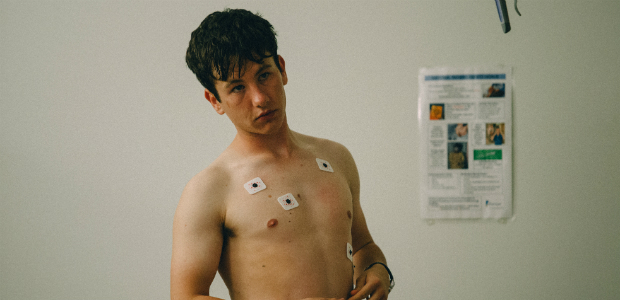The Killing of a Sacred Deer
Lanthimos is a singular creative force approaching the height of his powers
Plot summary
Steve Murphy (Colin Farrell) is a successful surgeon living in what he would call domestic bliss with his wife Anna (Nicole Kidman) and children Kim (Raffery Cassidy) and Bob (Sunny Suljic). He frequently meets up with Martin (Barry Keoghan), a teenage boy with whom he shares some sort of kinship. When Bob falls ill under mysterious circumstances, though, Martin reveals that his friendship was merely a prelude to something much more sinister…

Yorgos Lanthimos is the arthouse equivalent of a high concept filmmaker. His best known films, in particular, can be described in a single sentence, be it ‘parents keep kids isolated from the outside world via a manufactured reality’ or ‘dystopian future sees single people turned into an animal of their choice’. What separates them from the likes of, say, Die Hard or (god forbid) Snakes on a Plane, though, is that as succinct as their premises may be, their executions open up a world of uneasy implications. You leave a Lanthimos joint not entirely sure what to make of what you just saw, but certain that it has affected you in a way that will haunt you for a long time.
The Killing of a Sacred Deer, Best Screenplay winner at this year’s Cannes, continues this trend. It isn’t immediately apparent exactly what Lanthimos has in mind for us this time around, but once the table is set and the mechanisms are in place, the ‘high concept’ proves to be delightfully devilish. Part of the joy of Lanthimos’ films is in gradually getting to grips with the rules and inner workings of his worlds; the moment that a crucial piece of the puzzle snaps into place is, in its own way, exhilarating, bringing with it hilarity, grotesquerie or some sadistic combination of the two. The Killing of a Sacred Deer is essentially built around a very dark thought experiment, one that the above synopsis doesn’t even begin to scratch the surface of, and it carries all the more impact through its unexpectedness. This review will therefore try its very best to tread lightly in order to preserve that mystery.
What can be said is that, five films in, Lanthimos’ aesthetic is as robust, singular and otherworldly as anything else in contemporary cinema. Off-kilter compositions make ample use of negative space; sterile environments provide a physical counterpart to the actors’ stilted line deliveries; wide, prowling shots observe the characters as if they were cells in a petri dish. The effect is jarring, disorienting, intentionally off-putting – and utterly, intoxicatingly fascinating. It’s a formidable force and, welded to the right narrative (a la The Lobster), completely debilitating.
As intriguing as the moral dilemma at the centre of Sacred Deer is, though, it never quite reconciles itself with the look and feel of the film built around it. Martin’s scheme is one designed to plunge a dagger into the heart of the Murphy family, as punishment for a botched surgery that robbed the boy of his father. It’s a tremendously dark proposition, one rife with existential fear, familial dread and bastardisations of the Price equation, but it never accumulates the power it needs to really stick that ice pick into your soul. Lanthimos instead keeps you at arms length, making you watch as he puts this family through the wringer and leaving you helpless to do anything about it. It’s disconcerting and, true to form, stays under your skin long after the credits roll, but the theme never coalesces into a truly satisfying whole like it did in The Lobster or Dogtooth.
But just because it’s a lesser Lanthimos doesn’t mean that it doesn’t have charms of its own. Thimios Bakatakis, the go-to cinematographer for Greek oddballs (see also: Attenberg), is an unnerving presence, slowly ratcheting up the menace scene-by-scene and providing images that might well stalk your nightmares. The cast, too, are exceptional, with the returning Colin Farrell playing Steve as a sociopath-in-waiting who just needed a nudge to start coming loose at the seams, and Nicole Kidman keeping everything quietly simmering beneath the surface. Sacred Deer’s true coup, though, is its use of rising star Barry Keoghan. Effortlessly transitioning from a distant, tortured soul to smiling, spaghetti-slurping psychopath, Keoghan turns in a performance that evolves and mutates over time, re-contextualising everything that came before it in the process. It’s mightily impressive, and one that further marks him out as one to watch. (On an side note, it’s always nice to see Alicia Silverstone pop up, as she does here as Martin’s sad-sack mother.)
Ultimately, Sacred Deer only registers as a disappointment when graded on a curve. Taken on its own terms, it’s an understated confrontational slice of psycho-horror that tackles its subject matter in a way that no other filmmaker really could (or would). Lanthimos has an uncanny ability to wrestle a laugh out of you over the darkest pits of human behaviour, while making you flinch at what could otherwise be seen as a tossed-off joke. Even if his latest doesn’t match form and content in a way that’s as satisfying as you’d hope, it is still the work of a singular creative force approaching the height of his powers.
The Killing of a Sacred Deer is screening as part of the BFI London Film Festival 2017.











COMMENTS